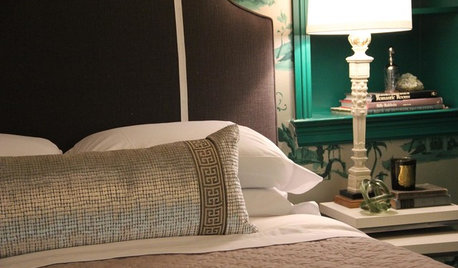More Troublesome Pronunciations, Etc
friedag
15 years ago
Related Stories

GREAT HOME PROJECTSUpgrade Your Front Yard for Curb Appeal and More
New project for a new year: Revamp lackluster landscaping for resale value, water savings and everyday enjoyment
Full Story
INSIDE HOUZZ9 Power-User Tricks to Get More From Houzz
Search faster and better, tap into design guides, manage your ideabooks and see photos on your flat-screen TV
Full Story
HOME INNOVATIONSConsidering Renting to Vacationers? Read This First
More people are redesigning their homes for the short-term-rental boom. Here are 3 examples — and what to consider before joining in
Full Story
BATHROOM DESIGN5 Common Bathroom Design Mistakes to Avoid
Get your bath right for the long haul by dodging these blunders in toilet placement, shower type and more
Full Story
SMALL SPACES10 Tips for Chic Little Bathrooms
Get more visual appeal and storage in less space, following the lead of these stylish compact bathrooms
Full Story
KITCHEN DESIGNStandouts From the 2014 Kitchen & Bath Industry Show
Check out the latest and greatest in sinks, ovens, countertop materials and more
Full Story
BATHROOM DESIGNA Crash Course in Bathroom Faucet Finishes
Learn the pros and cons of 9 popular faucet finishes
Full Story
BEDROOMSDesigner Tips for Creating a Better Bedroom
In the dark about bedside lamps? Waffling over pillows at the store? Try these ideas for a more comfortable bedroom
Full Story
DECORATING GUIDES11 Smart Decorating Ideas for Wall Niches
Don’t let an unusual wall space get you down. Fight back with shelves, plants, firewood, bright colors and more
Full Story
LIGHTING15 Ways to Create Drama With Light Fixtures
Use lights as artful decorating elements, and watch them draw attention for more than their ability to illuminate
Full Story


woodnymph2_gw
veer
Related Discussions
Locally Used Pronunciations
Q
Troublesome cutting
Q
Troublesome shade yard, I think....
Q
Albuquerque, Ne Mexico, pests, plants etc
Q
ccrdmrbks
organic_bassetlvr
friedagOriginal Author
colleenoz
friedagOriginal Author
friedagOriginal Author
Kath
ccrdmrbks
friedagOriginal Author
Chris_in_the_Valley
rosefolly
friedagOriginal Author
Chris_in_the_Valley
veer
woodnymph2_gw
ccrdmrbks
friedagOriginal Author
woodnymph2_gw
friedagOriginal Author
ccrdmrbks
woodnymph2_gw
Chris_in_the_Valley
friedagOriginal Author
woodnymph2_gw
veer
friedagOriginal Author
rosefolly
friedagOriginal Author
Kath
veer
ccrdmrbks
georgia_peach
woodnymph2_gw
Chris_in_the_Valley
friedagOriginal Author
friedagOriginal Author
Kath
ccrdmrbks
woodnymph2_gw
Chris_in_the_Valley
friedagOriginal Author
Chris_in_the_Valley
veer
ccrdmrbks
woodnymph2_gw
friedagOriginal Author
Kath
Chris_in_the_Valley